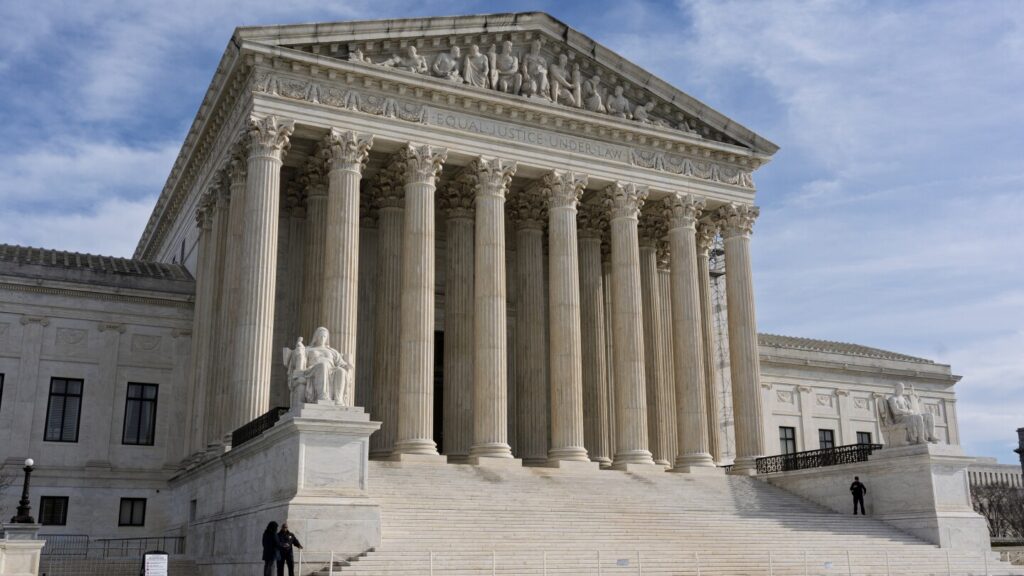WASHINGTON (AP) — When it comes to respecting the rulings of courts, President Donald Trump has been of two minds.
If the decision goes his way, as it did when the Supreme Court ruled 11 months ago that his name should be on the ballot in Colorado, he hails it as a “BIG WIN FOR AMERICA.”
Now, as president, he has been critical of federal judges who have moved to block some of his most contentious actions, such as his move to freeze federal spending. His vice president, JD Vance, recently said, “Judges aren’t allowed to control the executive’s legitimate power.” Billionaire Elon Musk, a senior Trump adviser, reacted angrily to a judge’s order temporarily blocking Musk’s Department of Government Efficiency from accessing Treasury Department records. “A corrupt judge protecting corruption. He needs to be impeached NOW!” Musk posted.
Though Trump said on Tuesday in the Oval Office that he would abide by the rulings of the courts, the Republican president is clearly pressing the boundaries of the relationship between the executive and judicial branches. In doing so, he may be headed to a test of one of the most foundational cases in American constitutional law, Marbury v. Madison, in which the Supreme Court established the principle that the courts are the final arbiters of the law.
Here are some questions and answers about the judiciary’s role in American government.
Where did it all begin?
In 1803, Chief Justice John Marshall first expressed the principle that while Congress makes the laws and the president enforces them, the courts decide when either of the other branches goes too far.
“It is emphatically the province and duty of the judicial department to say what the law is,” Marshall wrote in Marbury v. Madison.
The notion goes back even further, to England, when the courts were given a measure of independence from the crown, said Saikrishna Prakash, a University of Virginia law professor. The Constitution implicitly expects the president to enforce judgments of the court, Prakash said. “There’s no point in separating the judicial from the executive if the executive can just ignore what the courts have decided,” he said.
Is the court supreme?
Justice Robert Jackson wrote that the court’s power came from it having the last word in legal disputes. “We are not final because we are infallible, but we are infallible only because we are final,” Jackson wrote in 1953.
Notably, the court lacks any independent means of enforcing its decisions, relying on the other parts of the government.
That was never more evident than in 1954, when the Supreme Court struck down segregation in public education in Brown v. Board of Education, then watched Southern states engage in years of defiance.
But Americans have come generally to believe that court decisions should be obeyed, even amid sharp disagreement. Retired Justice Stephen Breyer has pointed several times to Bush v. Gore, a 5-4 decision in 2000 that handled the presidency to George W. Bush. In a nationally televised address the next evening, Al Gore, a Democrat, said he accepted the outcome, though he strongly disagreed with it.
While president, Bush, a Republican, lost several cases involving people detained in the “war on terror” following the Sept. 11, 2001, attacks, including detainees held without charge at Guantanamo Bay, Cuba. Bush didn’t like the decisions, but he followed them.
“And that’s what I’m trying to get across as to why Americans have reached a point where they don’t even think about the decisions of the Court, not following them. They think it’s like the air we breathe,” Breyer said on a podcast in 2022.
What can Trump do if he doesn’t like a court decision?
Vance said judges have no right to keep presidents from using their “legitimate” power. A Yale-trained lawyer, Vance certainly understands that much depends on whether what the president is doing is legitimate in the first place. The Supreme Court stopped President Joe Biden from undertaking a massive student loan forgiveness program, a decision Vance applauded.
But when courts rule against them, presidents can try again, by invoking different authority or trying to change the law.
Each time the court cast doubt on the detention programs, Bush and congressional Republicans enacted new legislation, said Georgetown University law professor Brad Snyder. Biden, a Democrat, also tried and failed to implement a different broad loan forgiveness program.
“This is a constitutional conversation. The job of courts is to uphold the rule of law, not to have the last word in the conversation,” Snyder said.
What has the Roberts Court done?
Already in the lower courts, judges who have paused some of Trump’s orders on spending, financial incentives for federal workers to quit and DOGE’s work have been harshly criticized by Trump’s allies.
Chief Justice John Roberts wrote recently that judicial independence is being undermined by, among other things, the prospect of defiance of court orders. “Violence, intimidation, and defiance directed at judges because of their work undermine our Republic, and are wholly unacceptable,” Roberts wrote in his annual report in December.
Some progressive commentators have said they worry that the court’s decision, written by Roberts, granting presidents broad immunity from prosecution for official acts will embolden Trump.
“It would be a big deal if the Trump administration said, ‘We’re not going to comply with a judicial order,’” Prakash said.
Snyder pointed to another line from Marshall’s opinion in 1803 in which he noted the U.S. is “a government of laws, not of men,” quoting John Adams.
“That’s the tradition we need to uphold in 2025,” Snyder said.
___
Follow the AP’s coverage of the U.S. Supreme Court at https://apnews.com/hub/us-supreme-court.


